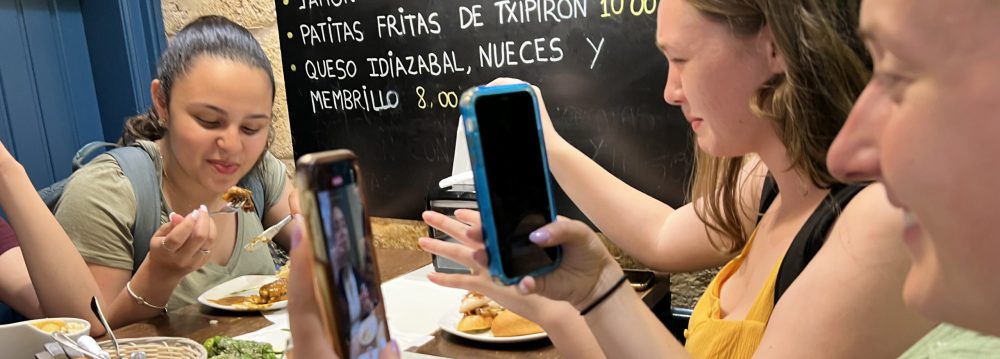Kaixo! Zermoduz zaude?
If you are wondering what you just read, do not worry. I would not have known either, if not for the Basque language class that we engaged in on our fifth day in San Sebastian.
Our class was led by Stuart, a Scottish man who is greatly familiar with Basque culture as well as other languages. He quickly introduced us to many key Basque words and phrases, such as the greeting I wrote above, meaning “Hello! How are you?”
Although such a phrase is quite basic, the pronunciation required in the Basque language is anything but that. It involves many unusual phonemes, such as ”z” which, as Stuart described, sounds like hairspray, “tz” which requires a harsher “tsssss” sound, “ts” which makes a “tshhh” sound, and “tx” which is equal to “ch”.
Sounds confusing? Believe me, it is! However, the complexity of Basque does not end there. In addition to words and pronunciation, Stuart educated us on Basque history, and the mystery behind it.
Stuart explained to us that there are written records from the 1st Century AD of a people called the Vascones inhabiting two parts of the Basque region: Navarre and Aragon. Studies of their language and that of the modern-day Basque show an etymological correlation. However, there is no overall proof of ancestry between the Vascones and Basque. Despite this, the Basque people take great pride in their history and its enigmatic nature.
While we continued to learn more about the Basque language and history, what I learned the most from my time with Stuart can be encompassed by two themes: pride and connection.
The first theme, pride, has already been discussed. While writing about Basque culture, it would be remiss of me to not mention the amount of pride that the Basque people have not only for their history, but for their home in the present and future. The Basque Region possesses a large amount of self-governance, and has their own independent taxation for its inhabitants. This has led to a thriving healthcare system, beautiful infrastructure, and from what I’ve seen, a high standard of living. In terms of the future, the Basque people have one of the highest life expectancies in the world, which is estimated to increase.
However, the only action needed to witness the pride within the Basque Country is to visit it! I have only been here for five days, yet I notice this strong self-identity all around me. As I walk through the streets of Parte Vieja and taste a Pintxo full of local livestock and produce, I can smell and taste the pride. When I try my best (which is not worthy of any applause) to greet someone in Basque, the expression on their face emits gratitude for my awkward efforts. Basque pride is all around me: in the food, the people, the beautiful bridges I bike on, the marvelous beach I relax on, and much more.
The second theme I found is that of connection. Growing up in the United States, I was first introduced to another language (Spanish) in middle school. Since then, I have continued to study Spanish in the hope of one day reaching fluency. Although, in my experience, aspirations such as this are few and far between. Most people in my middle school and high school either did not take language classes seriously, or quit the class and language altogether as soon as they got the chance.
On the contrary, the majority of people I have met in San Sebastian, of all ages, tend to speak more than one language. I acknowledge the fact that I am in a tourist city, yet I cannot help but express my amazement towards the amount of people who possess the ability to converse with people from various backgrounds. Additionally, I feel gratitude to each and every person who makes the effort to speak to me in English: a sentiment that leads me to a final question that I believe San Sebastián has answered for me.
As I sat in the park practicing a completely new and foreign language to my mind, and listened to the complex etymological history of Basque, a question, perhaps odd, entered my mind: what is a language?
While the class went on, I noticed curious locals stopping as they walked by us. They listened as we spoke, and smiled once they heard us speaking their native tongue. This had a profound effect on me. It showed me that a language is much more than a conversation. A language is a hug, needed by someone who has just entered a foreign country and hears their native language for the first time. Language is a handshake, held together by two people trying their best to conquer a language barrier, and the mutual respect they share for their efforts. Language is a fire, lighting a spark in someone who just heard one for the first time, and is determined to learn it, day by day.
Most importantly, I believe that now more than ever, language is a connection. Not just between two people, but between differing backgrounds, experiences, and stories that every person possesses. While my time in San Sebastián has only begun, I have already felt my perspective and personal beliefs being challenged by each foreign experience. Through each person I meet from all corners of the globe, I have made impactful connections with not only them, but the sentiments, perspectives and stories that they choose to share with me. In a world full of the turbulence of injustice, violence and greed, the small effort that language requires: a simple greeting or phrase, has the power to create a connection capable of change and benevolence for our world.
